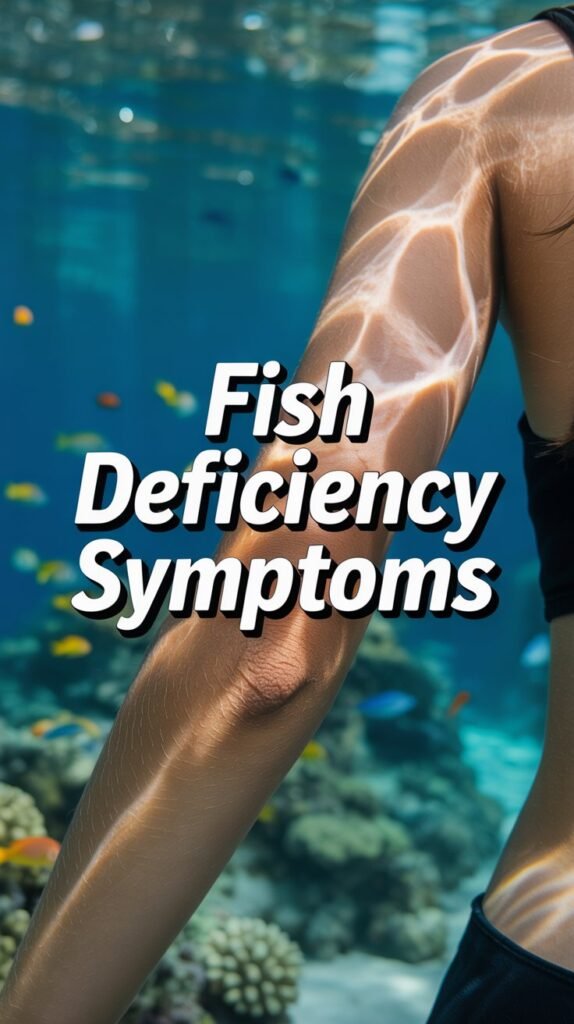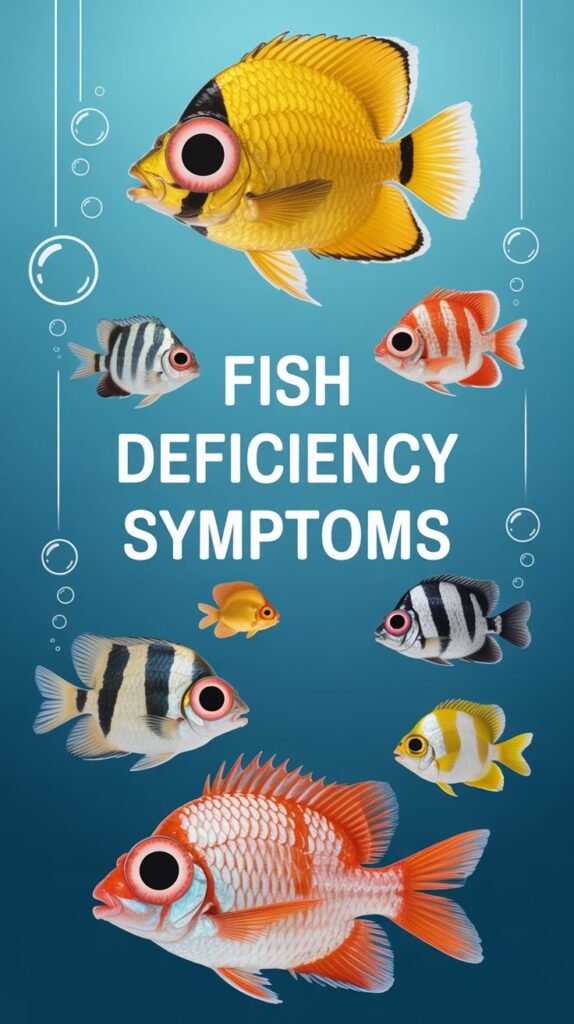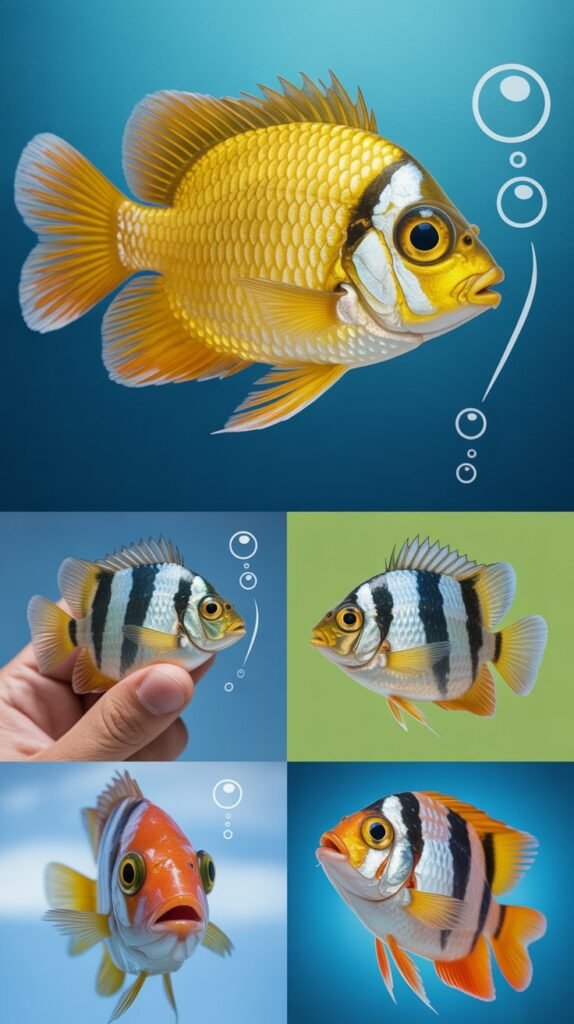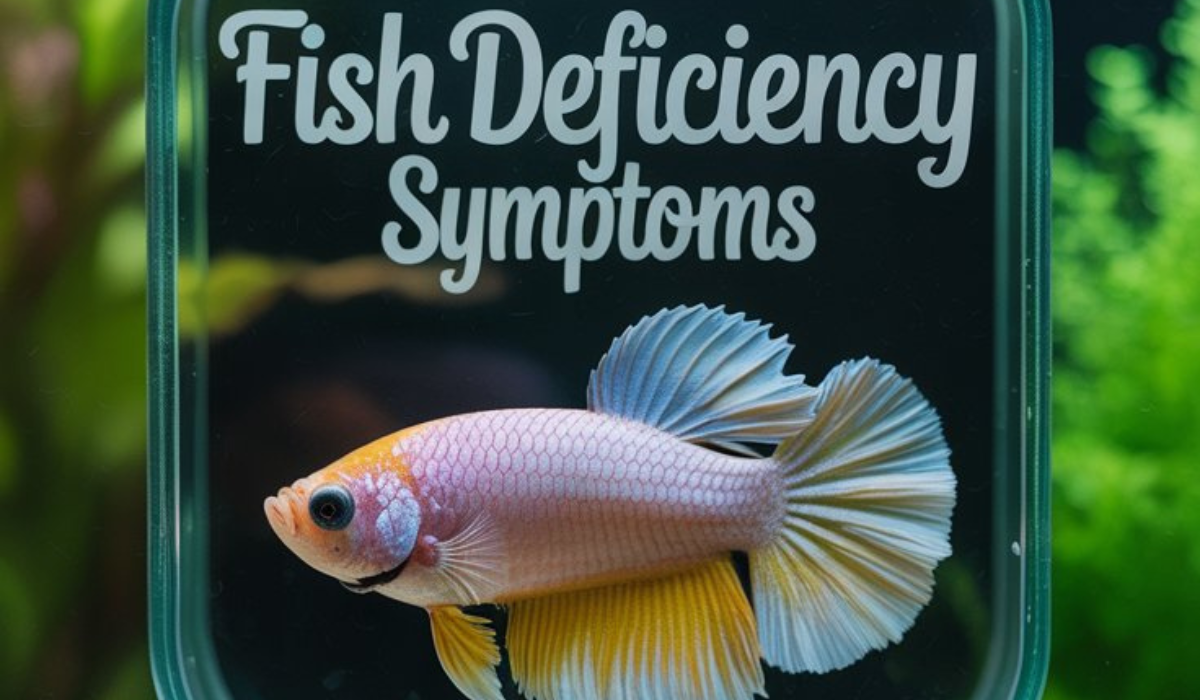Keeping fish healthy in an aquarium, pond, or natural habitat requires more than just providing water and food. Just like humans and other animals, fish need a balanced intake of essential nutrients, vitamins, and minerals to maintain optimal growth, coloration, and resistance against diseases. When fish lack these vital nutrients, they begin to show clear warning signs of nutritional deficiencies. Understanding fish deficiency symptoms is crucial for aquarists, breeders, and fish farmers to ensure the well-being and longevity of their aquatic pets
This guide explores the most common deficiency symptoms in fish, what causes them, and how to correct these imbalances through proper nutrition and care
Why Nutritional Balance Matters in Fish
Fish depend on a variety of nutrients to maintain their body functions. Proteins are vital for muscle growth and repair, fats provide energy, carbohydrates support metabolism, and vitamins and minerals regulate organ function and immunity. A deficiency in even one essential nutrient can disrupt this balance, leading to visible health issues. Since fish cannot store all nutrients in large amounts, they require a steady supply through their diet. Unlike in the wild where they consume a diverse range of natural foods, aquarium fish often rely on processed diets, which makes them more prone to deficiencies if their food lacks variety or quality
General Signs of Nutritional Deficiencies in Fish

Before diving into specific nutrients, it is useful to recognize the general warning signs of deficiencies. These symptoms are often the first red flags that something is wrong with the diet of your fish
- Slow or stunted growth – young fish fail to reach expected size
- Loss of vibrant colors – fading or dull scales due to lack of pigments or vitamins
- Lethargy and weakness – reduced activity levels and slow swimming
- Abnormal swimming patterns – erratic movement or difficulty balancing
- Decreased appetite – refusal to eat or reduced feeding response
- Frequent illnesses – weakened immune system leading to infections
- Poor fin condition – frayed, curled, or eroded fins
- Skeletal deformities – bent spines or misshaped bodies
These general symptoms often overlap, making it important to identify the specific nutrient lacking in the fish diet
Common Fish Deficiency Symptoms by Nutrient
1. Protein Deficiency
Proteins are the building blocks of life, essential for tissue repair, growth, and reproduction. A lack of protein leads to noticeable physical and behavioral changes
Symptoms of protein deficiency in fish
- Stunted growth in juveniles
- Muscle wasting and weight loss
- Reduced reproductive performance
- Weakened immunity
- Lethargy and slower movement
Causes: Poor-quality fish food with low protein content, overuse of fillers like wheat or soy in cheap diets
Solution: Feed high-quality protein sources such as fish meal, shrimp, krill, worms, or high-grade commercial pellets
2. Vitamin A Deficiency
Vitamin A supports vision, immunity, and cell development in fish. When fish lack this vitamin, their health deteriorates over time
Symptoms of Vitamin A deficiency
- Eye problems, including cloudy eyes
- Poor growth and skeletal deformities
- Reduced resistance to disease
- Skin lesions or rough scales
Solution: Provide vitamin-rich foods like spirulina, algae, and fortified fish flakes
3. Vitamin C Deficiency

Vitamin C is essential for collagen formation and wound healing in fish. Since fish cannot synthesize it naturally, it must come from their diet
Symptoms of Vitamin C deficiency
- Fin erosion and body deformities
- Weak immune response, making fish prone to infections
- Poor wound healing
- Hemorrhages or bleeding under the skin
Solution: Feed vitamin C-enriched pellets or supplement with fresh vegetables like peas or spinach
4. Vitamin D Deficiency
Vitamin D regulates calcium and phosphorus metabolism, which are essential for bone and scale development
Symptoms of Vitamin D deficiency
- Weak or bent bones
- Poor growth
- Abnormal swimming posture due to skeletal deformities
Solution: Use fortified fish foods and ensure fish have access to natural or artificial light to support vitamin D absorption
5. Vitamin E Deficiency
Vitamin E acts as an antioxidant, protecting fish from oxidative stress
Symptoms of Vitamin E deficiency
- Muscular degeneration
- Loss of balance or erratic swimming
- Reduced fertility in breeding fish
- Increased mortality in fry
Solution: Supplement diet with vitamin E-rich foods such as shrimp meal and quality commercial diets
6. Calcium Deficiency
Calcium is vital for skeletal structure, scale formation, and nerve function
Symptoms of calcium deficiency
- Fragile bones and deformities
- Poor scale development
- Muscle spasms and weakness
Solution: Ensure water hardness provides enough calcium and feed calcium-rich foods like crustaceans
7. Iron Deficiency
Iron is essential for oxygen transport in fish blood. Without enough iron, fish struggle to stay active
Symptoms of iron deficiency
- Pale gills due to anemia
- Lethargy and reduced activity
- Slow growth
Solution: Provide iron through live foods like bloodworms and maintain good water quality to prevent iron depletion
8. Iodine Deficiency
Iodine plays an important role in thyroid function and metabolism
Symptoms of iodine deficiency
- Goiter (swelling near the gills or throat)
- Reduced metabolic rate
- Poor growth
Solution: Supplement diet with iodine-rich foods like seaweed, spirulina, or marine-based flakes
9. Essential Fatty Acid Deficiency
Fatty acids are crucial for energy, cell membrane integrity, and reproduction
Symptoms of fatty acid deficiency
- Loss of appetite
- Poor reproduction
- Dull coloration
- Weakened immunity
Solution: Include foods like brine shrimp, krill, and quality fish oils in the diet
10. Phosphorus Deficiency
Phosphorus works closely with calcium in bone development and energy transfer
Symptoms of phosphorus deficiency
- Weak bones and skeletal deformities
- Poor growth
- Loss of appetite
Solution: Use phosphorus-rich feeds and avoid feeding only plant-based diets to carnivorous fish
Causes of Fish Deficiency Symptoms

Nutrient deficiencies can arise due to various reasons:
- Poor diet quality – low-grade fish food with insufficient nutrients
- Monotonous feeding – relying only on one type of food such as flakes or pellets
- Overprocessed feeds – excessive heating during processing destroys heat-sensitive vitamins
- Lack of natural foods – absence of live or frozen foods that provide essential nutrients
- Environmental stress – poor water conditions can impair nutrient absorption
- Overcrowding – competition for food leads to unequal nutrient intake among fish
How to Prevent Nutrient Deficiencies in Fish
- Feed a varied diet including flakes, pellets, frozen, and live foods
- Choose high-quality brands that guarantee vitamin and mineral fortification
- Avoid expired food as vitamins degrade over time
- Supplement diets with natural vegetables or specialized fish vitamins
- Maintain water quality since poor conditions stress fish and reduce nutrient uptake
- Observe your fish daily for early signs of deficiency so corrective measures can be taken quickly
Conclusion
Understanding fish deficiency symptoms is essential for every aquarist, whether you keep a home aquarium or manage a large fish farm. Nutrient imbalances can weaken fish, reduce their lifespan, and impact breeding success. By providing a balanced, varied, and high-quality diet along with proper environmental care, these deficiencies can be prevented or corrected effectively. Early recognition of symptoms followed by immediate dietary improvements ensures that fish remain healthy, colorful, and active for years to come
FAQs about Fish Deficiency Symptoms
Q1: What are the first signs of nutrient deficiency in fish?
The first signs usually include faded colors, reduced activity, poor growth, and a weakened immune system
Q2: Can poor water quality cause nutrient deficiencies in fish?
Yes, poor water quality stresses fish and reduces their ability to absorb nutrients from food, making deficiencies more likely
Q3: Which vitamins are most important for aquarium fish?
Vitamin C, Vitamin A, Vitamin D, and Vitamin E are among the most important, along with essential minerals like calcium and iron
Q4: Can fish recover from nutrient deficiencies?
Yes, if deficiencies are detected early and corrected with proper nutrition, fish can recover fully, though severe skeletal deformities may remain permanent
Q5: How can I ensure my fish get enough vitamins?
Provide a mix of high-quality commercial foods, supplement with fresh or frozen foods, and occasionally add vitamin-enriched diets or liquid supplements

